
Even as breakup messages go, the one Italian prime minister Giorgia Meloni had for Beijing earlier this month was exceptionally delicate. Italy’s government is looking at quitting the Belt and Road Initiative (BRI) — Chinese president Xi Jinping’s signature foreign policy program — but Meloni insisted her government still wanted to do business with China.
“There is no foreclosure on our part towards China… but on the Belt and Road Initiative, decisions must still be made based on an evaluation of its merits and on the results that this instrument has provided,” she told reporters earlier this month, after meeting with Chinese premier Li Qiang on the sidelines of the G20. “But from my point of view, that does not compromise anything in terms of our relations with China.”
In other words, Italy wants the relationship, but no labels.
For Beijing, this is a big ask. The BRI, after all, is a point of pride: Launched in 2013, it promised to “strengthen connectivity, leverage potential growth drivers, and connect markets.” In the years since, over 150 countries accounting for nearly three-quarters of the world’s population have signed on, and more than $1 trillion has been spent. Italy’s participation was seen as particularly special — a major endorsement of the BRI by a G7 country and a founding member of the European Union.
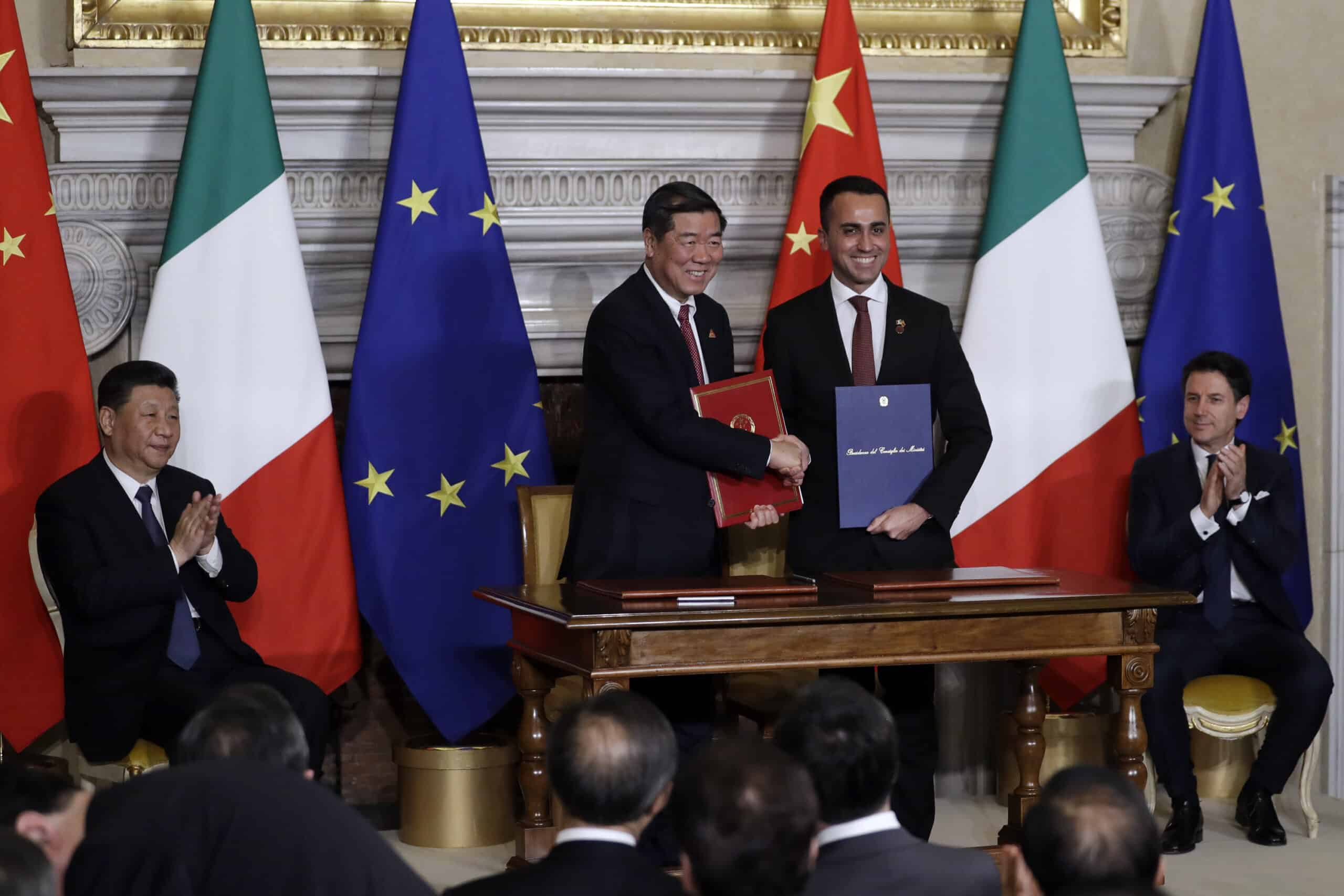
Its pending retreat and criticisms of the initiative thus not only represents an embarrassing affront, but a reality check about the legacy of the BRI.
“China wants BRI to be a broad, global initiative,” says Yun Sun, a senior fellow at the Stimson Center, a Washington, D.C., think tank. “For Italy to formally withdraw is certainly not a heartening development for the campaign. Countries dropping out — that suggests concerns and weakness.”
Back in 2019, when the two countries signed a non-binding memorandum of understanding (MOU) bringing Italy into the initiative, Italy’s government was led by a populist and Euroskeptic political party, which saw the deal as an opportunity to boost trade and attract Chinese investment. But less than five years on, officials in Rome say that the BRI has been something of a disappointment. While more Italian goods did go to China, Italy’s trade deficit nonetheless widened. Chinese foreign direct investment into Italy is also down — although the rest of the EU has seen similar declines.
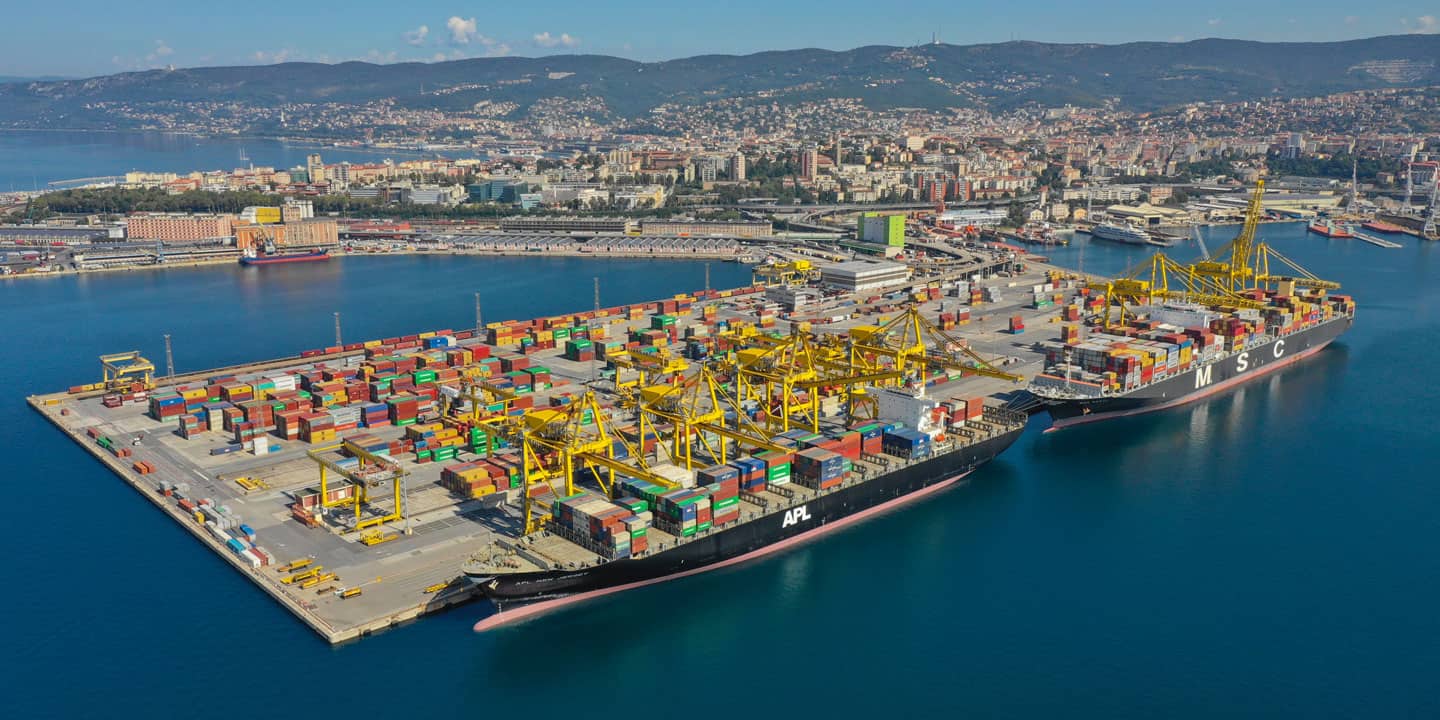
“For Italy in Asia, China is a first-rate partner,” says Carlo D’Andrea, vice president of the EU Chamber of Commerce in China. But, he adds, “in an agreement both parties should have a positive outcome. Right now it’s clear that Italy is not getting its dividend from the [BRI] agreement.”
At the same time, Italy’s participation in the BRI has cast a pall over its relationship with the U.S. and Europe. Its allies were blindsided when Rome announced its participation in the initiative, earning it strong warnings from the Trump administration and EU leaders at the time.
In Trieste, on the northern tip of Italy’s Adriatic coast near Slovenia, a largely overlooked port became a geopolitical flashpoint amid fears that investment by the state-owned China Communications Construction Company would turn it into a literal beachhead for Chinese influence in the EU. American officials also sounded the alarm about Italy’s contracts for Chinese 5G infrastructure, while Italian researchers have raised awareness about Chinese influence in the media and higher education.

Now, although Italy’s current government hasn’t publicly stated its intention to withdraw, it has signaled that it would like to terminate the MOU. Multiple ministers have expressed their dissatisfaction with the BRI as Meloni’s government has made efforts to move closer to the United States. In late July, for instance, just as Meloni was meeting with President Joe Biden in Washington, defense minister Guido Crosetto called the original decision to join the BRI an “improvised and atrocious move” in an interview with Italian newspaper Corriere della Sella.
Earlier this month, Italian foreign minister Antonio Tajani was more tactful with his words when he visited Beijing. “We didn’t achieve great results with the Belt and Road, but that doesn’t matter,” he said, according to The Wall Street Journal. “We are determined to move ahead with plans to strengthen our commercial ties.”
Whether Beijing agrees, however, is another matter. Although this isn’t the first time that a European country has withdrawn from a Chinese-led multilateral initiative — the Baltic states of Lithuania, Estonia and Latvia recently left Beijing’s “17+1” cooperative framework with Central and Eastern Europe — Italy’s withdrawal has been both more public and arguably more significant, given the BRI’s prestige and the two countries’ long-standing relations.
And recent history suggests Beijing could respond aggressively. “China has vowed to retaliate if Italy withdraws,” says Sun at the Stimson Center. “The question is how.”
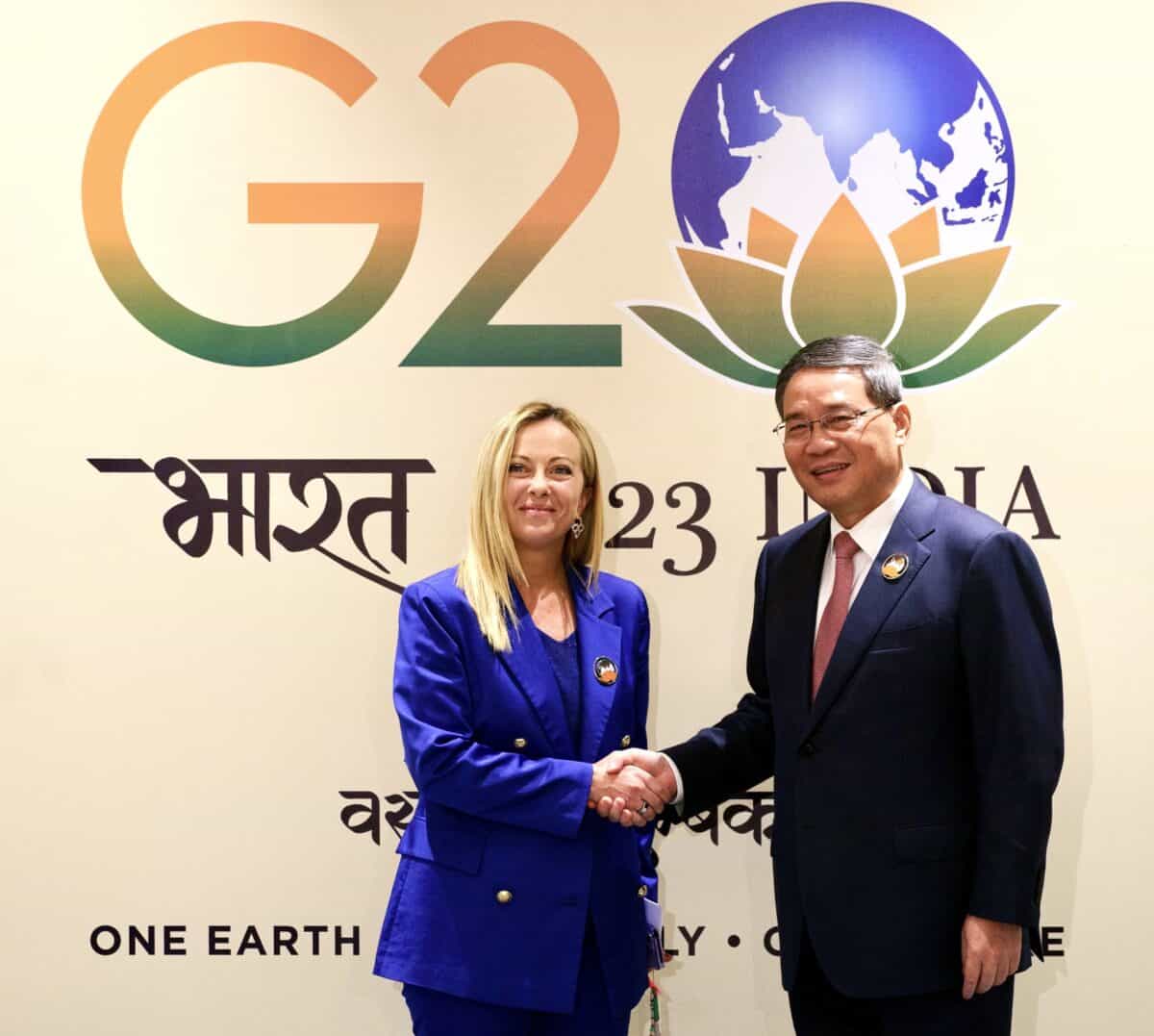
Sun and other analysts, however, note that China’s standing in Europe is not what it was just a few years ago. If Beijing chooses to inflict sanctions on Italy, for instance, it could further damage Europe’s trust of China, which Beijing can’t afford.
“Europe has a degree of leverage with China that it perhaps didn’t have a few years ago, because of the economic slowdown and escalating competition with the U.S.,” says Noah Barkin, a senior advisor with Rhodium Group’s China practice. “China really needs to keep Europe as close as it can. It has a strong interest in preventing Europe from moving in lockstep with the United States.”
Indeed, Beijing has been more muted in recent weeks than its former ‘wolf warrior’ persona would suggest. For example, when asked for a reaction to the defense minister’s “improvised and atrocious” comment, China’s Foreign Ministry spokesperson only noted that “further tapping the potential of Belt and Road cooperation services the interests of both sides,” and repeated this line following premier Li Qiang’s meeting with Meloni at the G20.
The question now, then, is what does the BRI have left to offer?
MARCO?
When the Italian merchant and explorer Marco Polo returned to Venice after more than a dozen years traveling around China, he brought with him amazing stories about life in the Mongol Empire (Yuan Dynasty). It was sometime around 1295, and his medieval audience was fascinated by his accounts of paper money (the creation of which was akin to “alchemy”), “black stones…that burn like firewood” (coal), and Kublai Khan’s new capital (Beijing), which was “greater than the mind can comprehend.”
In Italy there has long been this perception that we are the natural partner for China because of Marco Polo. The feeling was the Silk Road must end in Venice, no matter how.
Dario Cristiani, a senior fellow at the German Marshall Fund of the United States (GMFUS), a Washington, D.C., think tank
Ever since, in its national imagination at least, Italy has been linked to China. And experts say this historical tie accounts in no small part for the country’s long standing desire to maintain friendly relations with Beijing.
“In Italy there has long been this perception that we are the natural partner for China because of Marco Polo,” says Dario Cristiani, a senior fellow at the German Marshall Fund of the United States (GMFUS), a Washington, D.C., think tank. For Italy’s BRI proponents, he says, “the feeling was the Silk Road must end in Venice, no matter how.”

As early as the 1950s, the Italian state-backed utility company ENI established a presence in China. Italy also officially recognized the People’s Republic in 1970 — nine years before the U.S. did. And when the 1989 Tiananmen Massacre led several western countries and the World Bank to suspend loans to China, Italian development funds helped to finance the construction of Shanghai’s Pudong district, now the financial heart of the city.
In return, Italy was the first western country that then-premier Li Peng visited after Tiananmen. And today, the country is home to the largest population of Chinese people in the EU, according to Italian census data.
“Italy always had a double-track policy with the European track with NATO and the U.S., but also relationships with Russia and China,” says Giovanna De Maio, adjunct professor at the Sciences Po Paris School of International Affairs. “Factors like the Italian Communist Party [the largest communist party in Western Europe] played a role in that.”
In 2004, under the government of Silvio Berlusconi, Italy was one of the first countries in the EU to upgrade its relationship with China to a “comprehensive strategic partnership,” expanding the scope of bilateral cooperation and deepening business ties. The timing proved fortuitous: after the Italian economy was crippled by the 2008 recession, Chinese companies formed a financial lifeline for many struggling firms, kicking off a wave of dealmaking in the early 2010s.
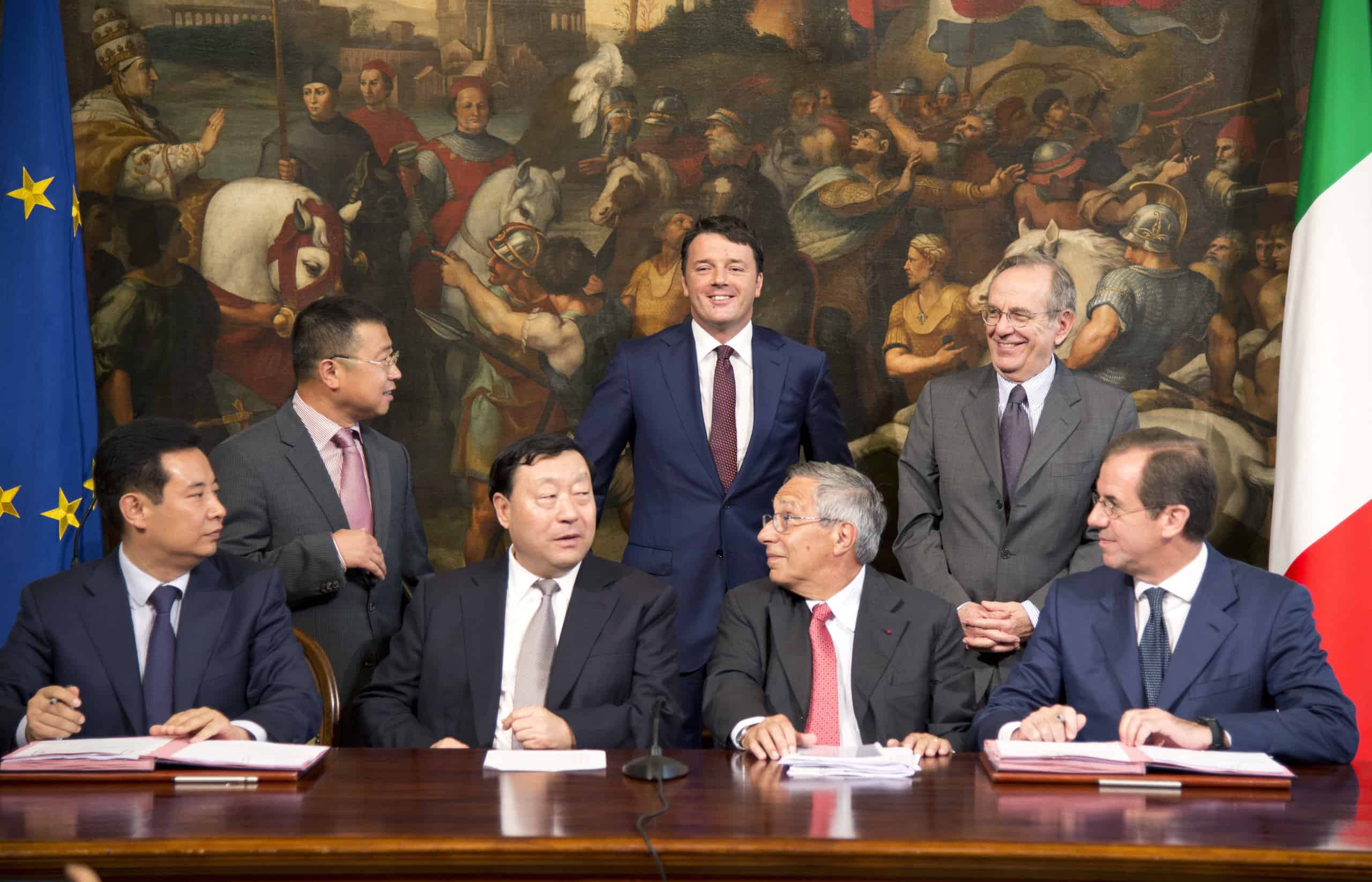
In 2014, for example, China’s state-owned electricity giant State Grid took a 35 percent stake in CDP Reti, a holding company with substantial interests in the Italian energy sector. The following year, the renowned tiremaker and Formula One supplier Pirelli was acquired for $7.7 billion by ChemChina. (ChemChina merged with Sinochem in 2021.) From 2013 to 2018, Chinese foreign direct investment into Italy exceeded $60 billion.
But even as Chinese investment in Italy rose, Italy’s cumbersome bureaucracy and political instability made it a less appealing destination for investment than its northern neighbors, France and Germany. Between 2013 and 2018, Chinese FDI in France and Germany outstripped investment in Italy by factors of three and eight to one, respectively, according to OECD data.
When a new coalition government came to power in Rome in 2018 — led by the Five Star Movement, a populist party that was generally friendly to China — it argued that joining the BRI could help Italy gain favor with Beijing and secure an advantage over its European counterparts.
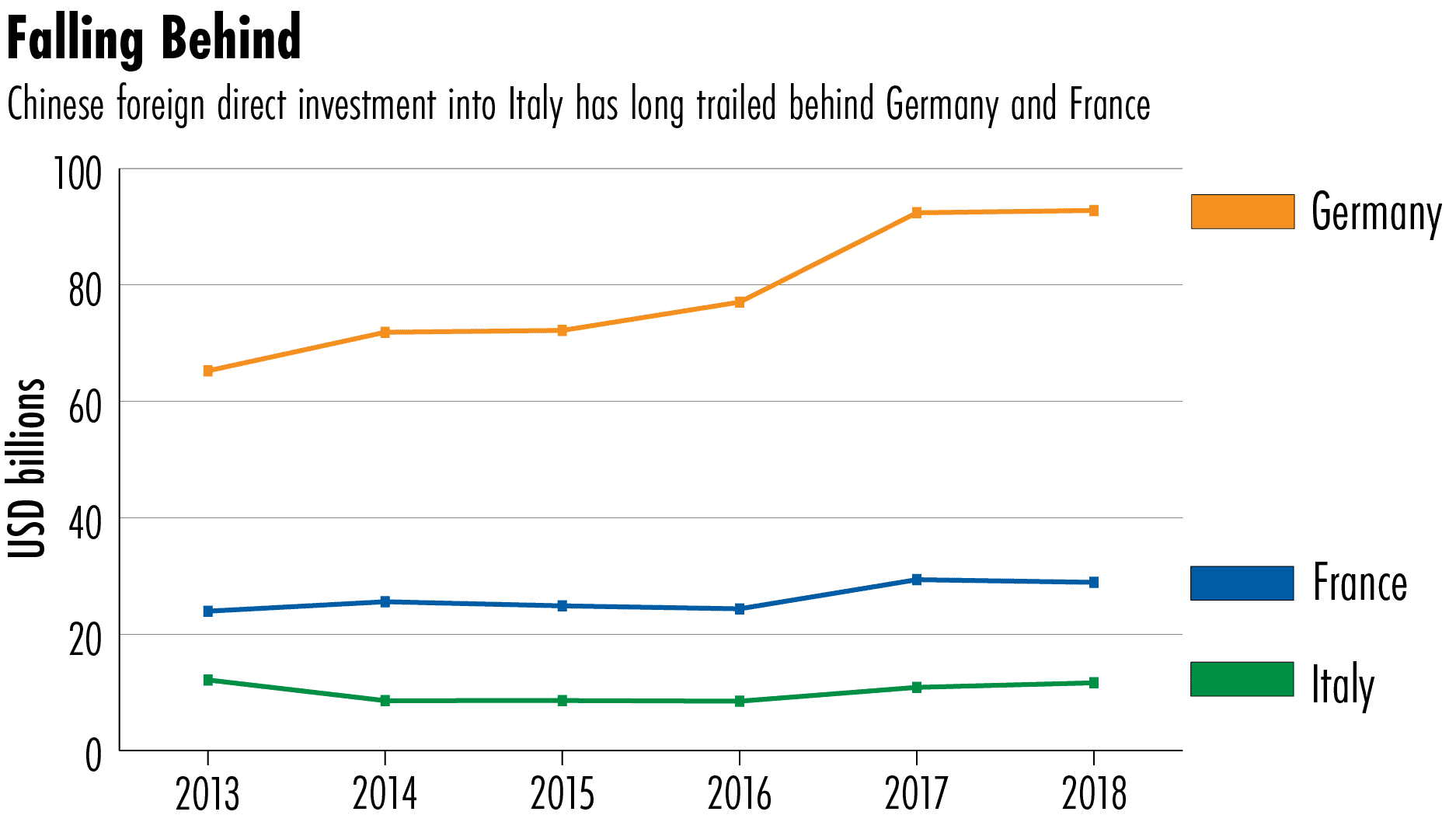
“[The Five Star Movement] had and still has a very eccentric foreign policy,” says Cristiani of the German Marshall Fund. “On a couple of things, they tried to implement something different. This was very much the case with China.”
Michele Geraci — who became Italy’s undersecretary of state at the Ministry of Economic Development through the coalition’s junior partner, the League — saw the BRI as an opportunity to make it easier for Italian companies to do business with China. A relative outsider to Italian politics, Geraci specialized in Chinese economics and had taught finance at the University of Nottingham in the Chinese city of Ningbo and also New York University’s campus in Shanghai. Once in office, he took on the role of architect for Italy’s entry into the BRI.
Previous administrations had already initiated discussions with China about joining the BRI, he told The Wire, but “these things tend to roll along for a long time without getting done. My contribution was direct experience working in China, and taking the memorandum to completion.”
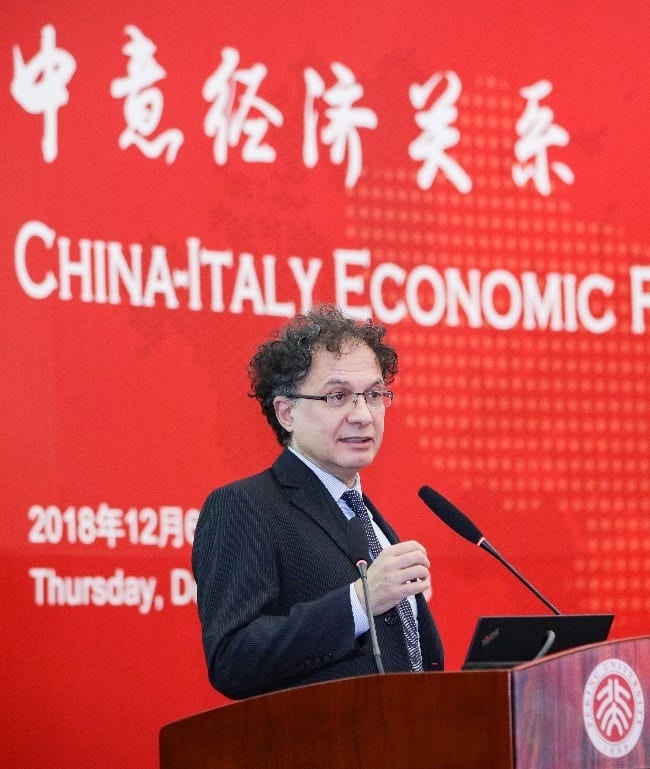
Part of what made the MOU attractive, he says, was its ‘no strings attached’ quality — the fact that it didn’t place obligations on either government or companies. “It was an agreement that offered free optionality value for Italian companies that want to do business with China,” he says.
The seven-page agreement highlighted particular areas where the two countries would deepen cooperation, including transport, logistics and infrastructure, as well as “unimpeded trade and investment.”
“No provision of this Memorandum is to be understood and performed as a legal or financial obligation or commitment of the Parties,” it adds.
The MOU was signed in March 2019, coinciding with Xi Jinping’s state visit to Italy. Even within the Italian government, however, there were clues that not everyone was on board; in a notable snub, Matteo Salvini, leader of the League, skipped the state dinner.
European leaders and the Trump administration also made their opposition known. Then-Secretary of State Mike Pompeo told Congress that he was “saddened” by Italy’s move, and Mark Rutte, the then-Dutch prime minister, warned Italy against “naivety.”
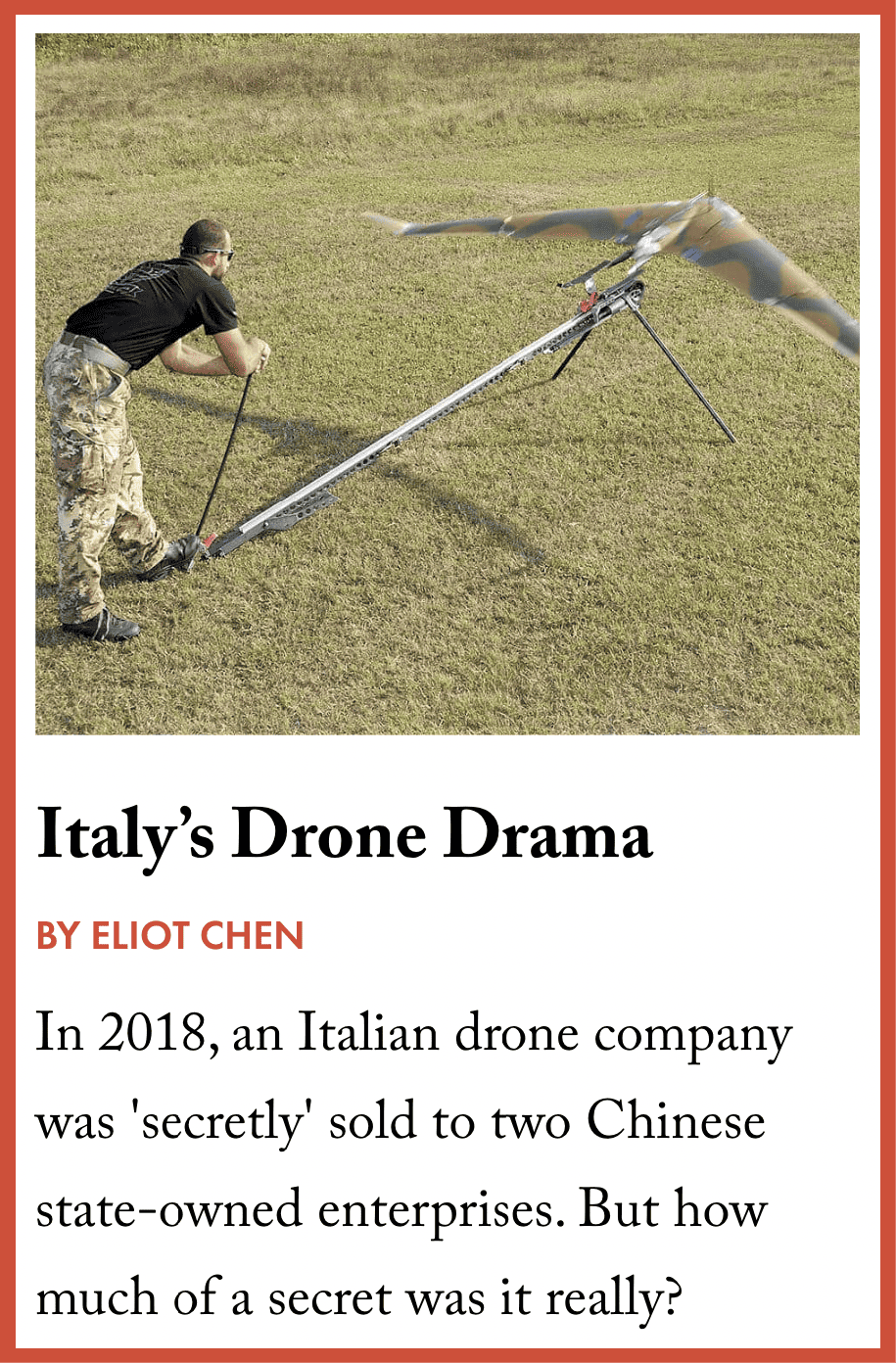
Especially alarming for Italy’s allies was China’s apparent interest in the country’s strategic sectors, from port infrastructure to telecommunications. A 2020 report by Copasir, Italy’s parliamentary national security committee, found that, to date, 400 Chinese companies had accumulated stakes in 760 Italian firms.
The Italian government does have the authority to scrutinize foreign investments, known as the ‘Golden Power,’ but its scope is limited and it has been used sparingly in the past. A key weakness, experts say, is its reliance on companies self-notifying about prospective deals, which has allowed some transactions — like the sale of an Italian dronemaker to a Chinese state-owned enterprise — to slip through the cracks.
Concerns about predatory takeovers by Chinese firms grew as the shock of the Covid pandemic took its toll on Italy’s economy.
“Italy got hit especially hard during the pandemic,” says D’Andrea, with the EU Chamber of Commerce in China. For many firms, he says, “it was ‘sell or go bankrupt’ due to the crash of the economy and supply chain issues.”
This could have led to a repeat of the 2008 financial crisis aftermath, with Chinese firms gobbling up Italian companies at bargain prices. But in early 2021, an abrupt collapse of the governing coalition ushered in a new administration led by Mario Draghi, the former president of the European Central Bank and someone with strong ties to the United States.
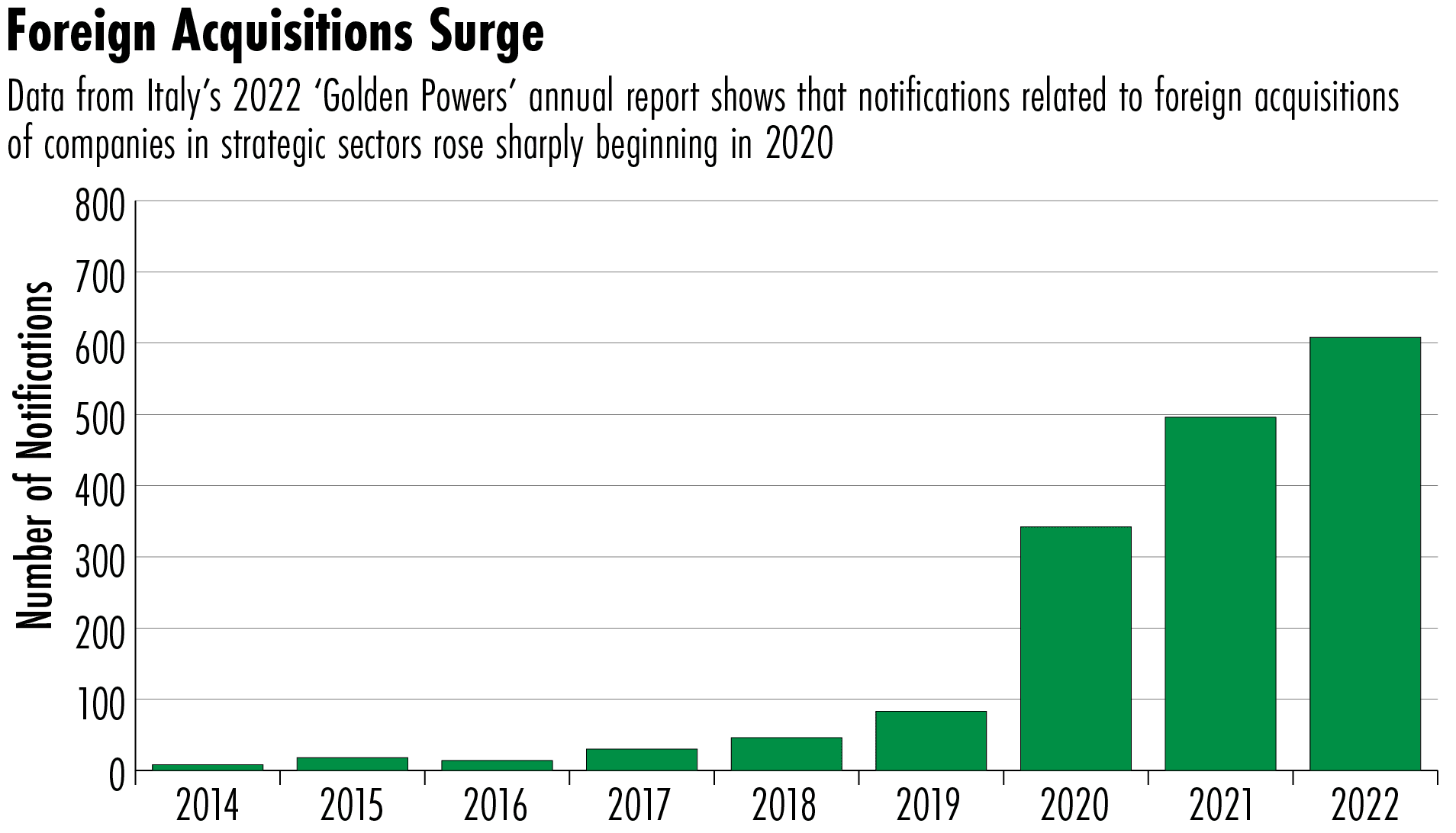
“Draghi saw the risks associated with closer economic cooperation with China,” says Rhodium’s Barkin. “He spoke softly but used a big stick to stop a number of Chinese acquisitions that his government felt posed security risks.”
Two months into his premiership, for instance, Draghi invoked the Golden Power to block Shenzhen Invenland’s acquisition of LPE, a privately-owned semiconductor firm that supplies STMicroelectronics, a major French-Italian chip manufacturer. Additional vetoes soon followed, including the sale of seed producer Verisem to Syngenta, which is owned by Sinochem. The government also worked with France to stymie an attempt by China’s FAW Group to acquire the French-Italian truck maker Iveco.
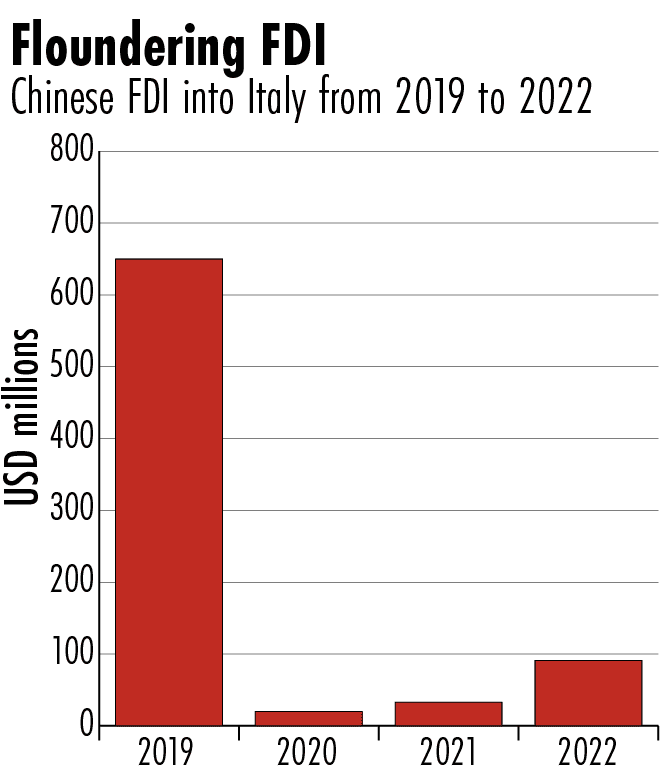
More Italian companies are now reporting their business dealings with foreign investors: In strategic industries, notifications by Italian companies saw a more than seven-fold increase between 2019 and 2022 — a change that has expanded the work of the Council of Ministers (the Italian cabinet), which wields control over the Golden Power.
By 2022, Chinese investment into Italy had plummeted to just $91 million, an 85 percent decline from two years earlier, according to Rhodium data. And as recently as June, the government used the Golden Power to block Sinochem from appointing a new CEO at Pirelli, after ruling that Pirelli’s business constituted a strategic asset in Italy.
SHOP LOCAL
Reflecting on the dearth of business activity between China and Italy since the MOU was signed, Francesca Ghiretti, an analyst at MERICS, says, “To be honest, not very much happened.” As Meloni’s government angles for a formal termination of the memorandum, she notes that the deal “already sort of died on its own.”
Which begs the question: Why is Italy making such a fuss to terminate a dead deal? Other BRI countries, says the Stimson Center’s Sun, “may not see the need to slap China in the face. They could just opt to slow down or scale back their participation in BRI.”
If you look at the political backlash that the MOU created for Italy, we can easily see that the cost of the backlash exceeded the limited economic gains, if any at all.
Giovanna De Maio, adjunct professor at the Sciences Po Paris School of International Affairs
But Italy is not just any BRI country. Following Russia’s invasion of Ukraine — not to mention the more than $200 billion in financial support awarded to Italy from the EU’s post-Covid recovery fund — Italy’s relations with its Western allies are stronger than they have been in years. As Ghiretti notes, “Considering how important the trans-Atlantic relationship is, the current government chose to align with Washington.”
Indeed, the irony of Italy’s decision to join the BRI is that, in the end, it may have made it harder for Italy to further business ties with Chinese firms.
“If you look at the political backlash that the MOU created for Italy, we can easily see that the cost of the backlash exceeded the limited economic gains, if any at all,” says Sciences Po’s De Maio. “Everything that Italy does in China now is seen in light of the MOU and the weight associated with it.”
The prime minister partially acknowledged this herself at the G20 last week, telling reporters: “What these past years have shown — particularly in Europe, where Italy was the only country to be part of the Belt and Road Initiative and all the others managed to have even better bilateral relations in terms of trade and investment — is that beyond the title, there are many tools for bilateral cooperation.”1Several other European countries have joined the BRI, including Portugal, Luxembourg, Poland, and others.
That may be, but those in Italy who would rather stay in the BRI say the government has failed to explain why withdrawing will improve bilateral relations. “If Meloni could explain why we’re leaving, the Chinese would maybe understand,” says Geraci, the architect of Italy’s MOU. “But the ministers have made no case, and the Chinese won’t see the logic.”
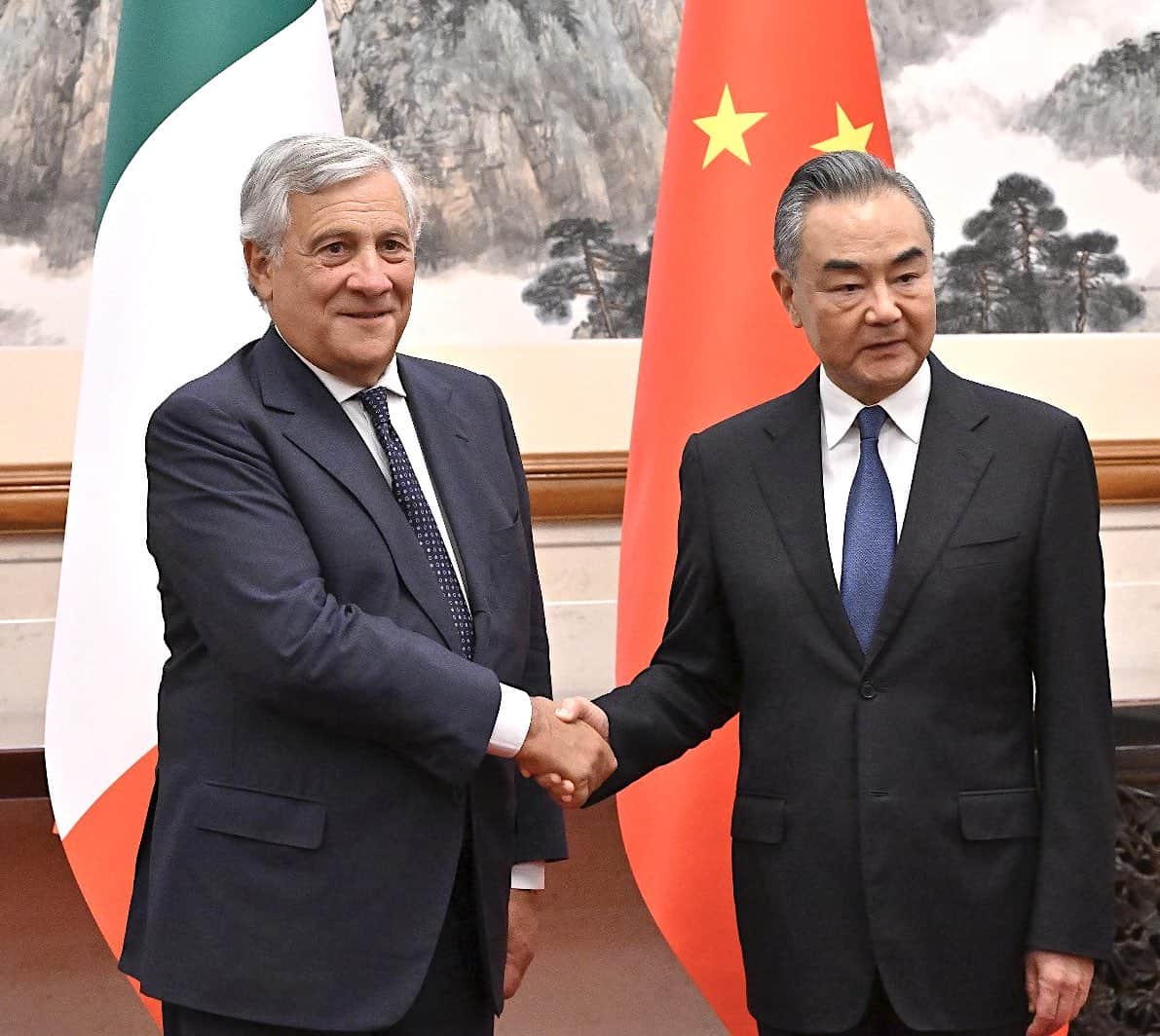
China, for its part, does seem to see Italy’s decision as a cynical political move. “The idea of sacrificing cooperation with China under BRI to gain something from the U.S. is a miscalculation,” noted one expert in China’s Global Times, a hawkish state-owned tabloid.
“Chinese consumers could react in ways that would hurt Italian businesses,” Geraci says. “Fashion, luxury goods could be the first to be hurt.”
Several people familiar with Rome’s plans say the government is working assiduously to smooth over this rift. It has planned multiple ministerial trips to Beijing in the coming weeks in the lead up to a possible visit by Meloni in November. And, as a conciliatory gesture, Italy’s president is expected to go to China next year to jointly commemorate the 600th anniversary of the death of Marco Polo.
If these overtures work, the best case scenario for Italy might entail a bilateral agreement similar to what France negotiated earlier this year, when president Emmanual Macron led a delegation to China and signed several major deals, including an agreement to build a new assembly line for Airbus in Tianjin. If Italy were to negotiate a similar high-profile deal, it could serve as a politically face-saving move for Beijing.
But in the meantime, some localities in Italy are taking matters into their own hands. As first reported by the Italian newspaper Il Foglio, as many as ten municipalities and the province of Brescia have joined a separate initiative, known as the Committee on Belt and Road Local Cooperation (BRLC). These local governments are concentrated in Italy’s northern industrial heartland, which is no stranger to Chinese investors. In 2020, the region of Lombardy, which includes Brescia, was home to almost half of all Italian firms with Chinese investors, according to Copasir.
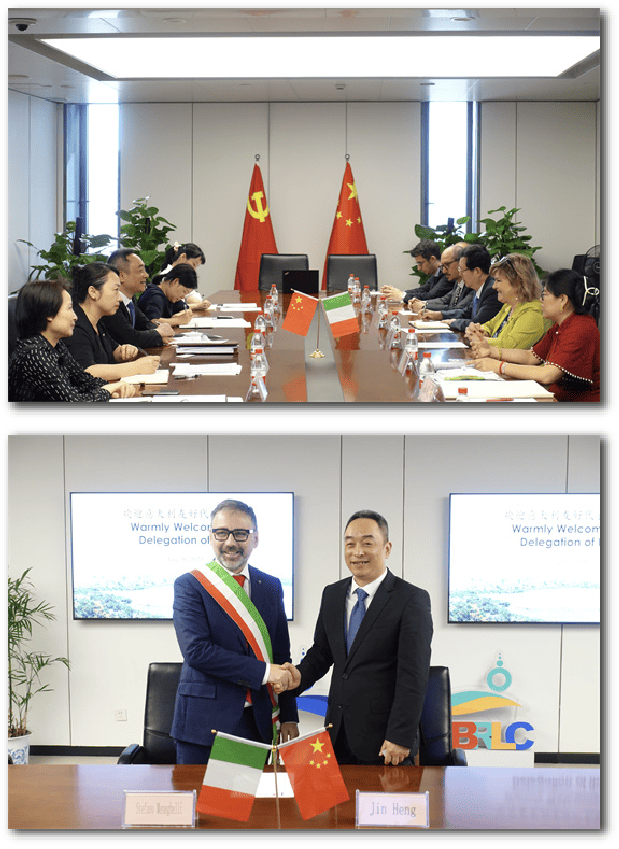
“In Italy there has always been an element of tension between local politicians who look at the investments in their communities and constituencies, and the central level which is concerned about security,” says GFMUS’s Cristiani. “China is extremely aware of Italy’s parochial political culture, so they try to target local politicians to move their interests forward. This is a tension that will remain extremely significant in Italy, even after Italy leaves the BRI.”
“Chinese authorities have a long history of approaching countries in Europe at the state and municipal level, thereby bypassing more skeptical policymakers at the national level,” adds Barkin.
The shift to a more localized approach may also better suit Beijing’s new strategy for BRI projects: Since 2021, Xi has called for investors to focus on “small but beautiful projects.” Rather than massive infrastructure projects spearheaded by China’s major state-owned enterprises, these investments would ideally be led by private companies or regional governments under the BRI banner. In the case of the BRLC, for instance, the initiative appears to be led by the local government of Hangzhou, the technology hub and capital of China’s wealthy Zhejiang province.
“If these local authorities remain part of the BRI, it would complicate the claim that Italy has exited,” says Nicola Casarini, an associate fellow at the Istituto Affari Internazionali, a Rome-based foreign policy think tank. “A better explanation would be that part of Italy exited the BRI.”
Even so, as Beijing organizes its 10-year anniversary fete next month for the BRI, Italy’s absence will surely be felt. The third ‘Belt and Road Forum for International Cooperation’ will be a “very important event” and celebrate how the BRI has “generated strong growth across partner countries,” according to the Global Times, a state-run publication. Yet, far from the colossus it was originally intended to be, the BRI doesn’t engender the same reaction from the West that it used to. Observers say that even if Rome does attend, it will likely dispatch a low-level delegation at most.
As it turns out, for Beijing, not all roads lead to Rome.

Eliot Chen is a Toronto-based staff writer at The Wire. Previously, he was a researcher at the Center for Strategic and International Studies’ Human Rights Initiative and MacroPolo. @eliotcxchen



